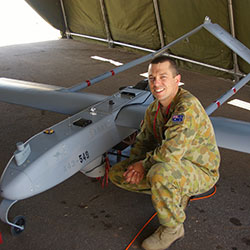We celebrate 60 years of the Spitfire Association and commemorate the founders of the Spitfire Memorial Defence Fellowship. As part of our commemoration, President of the Spitfire Association, Geoff Zuber spoke with several our Fellows to get their reflections on what the Fellowship means to them.
Fellow: Wing Commander Keirin Joyce CSC
Focus area: Defence emerging technology/Uncrewed Aerial Systems (UAS)
Year of Fellowship: 2009
How has the Fellowship supported your research, and what difference has it made?
I feel that being a recipient of the Spitfire Memorial Defence Fellowship has enabled me to build on my knowledge and increase my contribution to Defence UAS projects. This contribution goes beyond my research, into areas from my research that are being reinvested in designing projects around systems that are keeping Australia at the cutting-edge of UAS.
What advice would you give to potential Fellowship applicants?
One of the key benefits of the Spitfire Memorial Defence Fellowship is the flexibility and freedom it gives you in what you study and, importantly, how you carry out your research. Beyond presenting the outcomes of your research at the end of your Fellowship year, you really have an amazing amount of flexibility. I particularly liked the 'hands-off' approach of the Spitfire Association to how I used the Fellowship funds I received.
I would say to potential Fellows, 'go ahead and apply'. It is great fun and the flexible framework provided for you to do your research is unique and one of the key points of difference with the Spitfire Memorial Defence Fellowship.
I would also say that the Fellowship is not just about the amount you are awarded. It is not an endowment. It is so much more than that. I would ask potential Fellows considering applying to ask themselves, “how much of a difference do you want to make to Australian defence and resilience?” because that is what the Fellowship is really about.
I would also suggest they find out as much as they can about the Spitfire Association, not just about the Spitfire Memorial Defence Fellowship. I didn't really know about the Association until I presented on my research at the Annual General Meeting. Once you have found out about the Association and what it stands for, consider this in your application for a Fellowship.
Yours was one of the early Fellowships. Had you received $45,000 or more, what more could you have achieved with your Fellowship?
In hindsight, I would have focused on the strategic impacts of my research project, that result in a bigger step-change in uncrewed aerial systems (UAS). My research blinkers were on, and I was not thinking broader yet – I think this could have been pointed out to me by a mentor or advisor, perhaps someone from the alumni of the SMDF? I also would have used a significant portion of the funds to hire a modelling expert and have them build the models for me that are needed to test UAS in several Defence contexts.
With my Fellowship, I invested in a training course to build up my skills in using a discrete event modelling app. However, the skills I learned are perishable because I have not had the need to use the modelling app on a regular basis. This means, I'd need to learn the app all over again, to be able to get contemporary value from it.
I used most of my Fellowship to travel to the UK and US and get in front of the experts in UAS in those countries, which I found particularly valuable to building knowledge and relationships that I have been able to apply in Australia.
Having said that, I see the Fellowship as so much more than the dollars you are awarded. I was one of the earlier Fellowships, but I still gained incredible value from my Fellowship, something that is being continually reinvested into Defence now. I think the amount awarded now is a good amount and it does allow today's Fellows to supplement their salary or buy-in part-time expertise.
If you could meet the founders of the Fellowship today – AVM Lyndon Compton AO OBE, FLTLT Edward (Ted) Sly DFC and FLTLT Peter Watson DFC, what you say to them about your experience of the living memorial they established?
First, I would thank them for their foresight, and congratulate them. Their objectives for the Fellowship have stood the test of time. I would love to have met them and get a better understanding of their vision for the Fellowship.
My understanding of the aims of the Fellowship and why the Spitfire Association invested in this living memorial, rather than having a granite and bronze plaque at the Australian War Memorial, was because of speaking with Life Vice-President and Past President, Lysle Roberts.
Lysle's genuine interest in my research, the questions he asked and the fact he really cared about what I was planning to do made the biggest difference to how I approached my Fellowship. He and his interest inspired me to do well, not just for my Fellowship, but for its value to Defence. It has also inspired me to contribute to the Spitfire Association vision of 'carrying the spirit forward' and making sure this living memorial continues to support Australian innovation and research.
My enduring memories of Lysle are of a gentleman, and an individual who cared deeply for Australia as a great nation.
He didn't just show his genuine interest in my research, he also cared about my family, and he engendered in me a feeling of belonging to the Spitfire family, not just as a researcher but as a true contributor to Australia's future and resilience.
How important is it for uniformed Australian Defence Force personnel to be Fellows?
I think it is super important because, other than the Chief of Air Force scholarship, there are few opportunities to do research. Many serving personnel and reserves want to do research. They are equally committed to their service, so most end up doing study part-time, while continuing their service, which is a difficult balance to maintain.
I think anything that supports Australian Defence Force staff to study and further our learning is important and of a great benefit to our great nation. If more Defence staff (who currently study part-time) knew they could study full-time and apply for a Fellowship or something similar, I think many more would apply, and Australia would be better for it.


